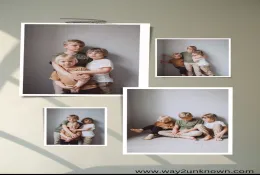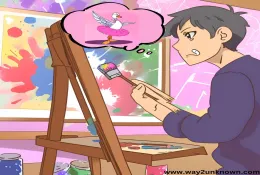To be knee-high to a grasshopper
 The idiom “To be knee-high to a grasshopper” means to describe someone who is very young or small in size. It’s used to emphasize how young or tiny someone was in the past, often in a nostalgic or affectionate way.
The idiom “To be knee-high to a grasshopper” means to describe someone who is very young or small in size. It’s used to emphasize how young or tiny someone was in the past, often in a nostalgic or affectionate way.
 The idiom “To be knee-high to a grasshopper” means to describe someone who is very young or small in size. It’s used to emphasize how young or tiny someone was in the past, often in a nostalgic or affectionate way.
The idiom “To be knee-high to a grasshopper” means to describe someone who is very young or small in size. It’s used to emphasize how young or tiny someone was in the past, often in a nostalgic or affectionate way.
 "Build castles in the air" means indulging in unrealistic or impractical dreams or plans that are unlikely to become reality. It warns against investing time and energy into pursuits lacking a solid foundation in reality. The phrase encourages focusing on achievable goals rather than wasting resources on fanciful aspirations.
"Build castles in the air" means indulging in unrealistic or impractical dreams or plans that are unlikely to become reality. It warns against investing time and energy into pursuits lacking a solid foundation in reality. The phrase encourages focusing on achievable goals rather than wasting resources on fanciful aspirations.
 "To bring the house down" is an expression denoting a performance or event that is exceptionally successful and well-received by an audience. Originating from theater, it symbolizes overwhelming applause and cheers elicited by an outstanding performance. It is commonly used across various forms of entertainment to signify the pinnacle of success and audience engagement.
"To bring the house down" is an expression denoting a performance or event that is exceptionally successful and well-received by an audience. Originating from theater, it symbolizes overwhelming applause and cheers elicited by an outstanding performance. It is commonly used across various forms of entertainment to signify the pinnacle of success and audience engagement.
 The idiom “to be housebound” encapsulates the experience of being confined to one’s home and the challenges that come with it. It highlights the importance of support systems, adaptability, and resilience in coping with circumstances that limit physical mobility and social interactions.
The idiom “to be housebound” encapsulates the experience of being confined to one’s home and the challenges that come with it. It highlights the importance of support systems, adaptability, and resilience in coping with circumstances that limit physical mobility and social interactions.
 To be a “jack-of-all-trades” embodies versatility, adaptability, and a broad skill set. While it has its advantages in certain contexts, individuals embodying this idiom should also recognize the importance of continuous learning and development to enhance their skills and expertise across various domains.
To be a “jack-of-all-trades” embodies versatility, adaptability, and a broad skill set. While it has its advantages in certain contexts, individuals embodying this idiom should also recognize the importance of continuous learning and development to enhance their skills and expertise across various domains.
 "To be lovestruck" describes the intense infatuation or fascination with someone, often characterized by overwhelming emotions and preoccupation with thoughts of the person. It implies being deeply affected or enchanted by feelings of romantic attraction, akin to being struck by Cupid's arrow. This state of being can lead to euphoria, obsession, and idealization of the object of affection, sometimes overshadowing rational judgment.
"To be lovestruck" describes the intense infatuation or fascination with someone, often characterized by overwhelming emotions and preoccupation with thoughts of the person. It implies being deeply affected or enchanted by feelings of romantic attraction, akin to being struck by Cupid's arrow. This state of being can lead to euphoria, obsession, and idealization of the object of affection, sometimes overshadowing rational judgment.
 "To be lovey-dovey" describes a couple displaying excessive affection and romantic gestures towards each other. It suggests a deep infatuation and fondness, often portrayed through cuddling, hand-holding, and sweet gestures. While it strengthens the bond between partners, it can also be perceived as overly sentimental or cloying by those around them.
"To be lovey-dovey" describes a couple displaying excessive affection and romantic gestures towards each other. It suggests a deep infatuation and fondness, often portrayed through cuddling, hand-holding, and sweet gestures. While it strengthens the bond between partners, it can also be perceived as overly sentimental or cloying by those around them.
 "To wear one's heart on one's sleeve" means openly displaying emotions and thoughts without hiding them. The phrase suggests transparency and vulnerability in expressing one's innermost feelings. While it can foster genuine connections, it also leaves individuals susceptible to emotional vulnerability and potential hurt.
"To wear one's heart on one's sleeve" means openly displaying emotions and thoughts without hiding them. The phrase suggests transparency and vulnerability in expressing one's innermost feelings. While it can foster genuine connections, it also leaves individuals susceptible to emotional vulnerability and potential hurt.
 "To be head over heels in love" describes an intense and all-encompassing romantic infatuation with someone. It signifies being deeply enamored and consumed by emotions to the point of feeling euphoric and consumed with thoughts of the beloved. This state of love can lead to heightened excitement and vulnerability, blurring the boundaries between fantasy and reality.
"To be head over heels in love" describes an intense and all-encompassing romantic infatuation with someone. It signifies being deeply enamored and consumed by emotions to the point of feeling euphoric and consumed with thoughts of the beloved. This state of love can lead to heightened excitement and vulnerability, blurring the boundaries between fantasy and reality.
 The idiom emphasizes the importance of authenticity, courage, and self-discovery in navigating life’s choices and challenges. It encourages individuals to break away from conformity, embrace their uniqueness, and pursue paths that resonate with their true selves, even if it means departing from the well-trodden roads taken by others.
The idiom emphasizes the importance of authenticity, courage, and self-discovery in navigating life’s choices and challenges. It encourages individuals to break away from conformity, embrace their uniqueness, and pursue paths that resonate with their true selves, even if it means departing from the well-trodden roads taken by others.
 The Swedish idiom “to feed the crows” means wasting something on someone who doesn’t appreciate it or giving something to someone who doesn’t deserve it. It’s like investing time, energy, or resources in a way that is ultimately unreciprocated or futile.
The Swedish idiom “to feed the crows” means wasting something on someone who doesn’t appreciate it or giving something to someone who doesn’t deserve it. It’s like investing time, energy, or resources in a way that is ultimately unreciprocated or futile.
 "To dance the duck's waltz" is an idiomatic expression denoting the futile or awkward attempt to perform a task beyond one's abilities. It humorously illustrates the mismatch between the intended action and its execution, likening it to a duck trying to dance a graceful waltz. The phrase emphasizes the inherent clumsiness or ineffectiveness of the endeavor, highlighting moments of ineptitude or absurdity.
"To dance the duck's waltz" is an idiomatic expression denoting the futile or awkward attempt to perform a task beyond one's abilities. It humorously illustrates the mismatch between the intended action and its execution, likening it to a duck trying to dance a graceful waltz. The phrase emphasizes the inherent clumsiness or ineffectiveness of the endeavor, highlighting moments of ineptitude or absurdity.
 "To have butter on one's head" is an idiomatic expression indicating someone's exceptional luck or good fortune. It suggests that the individual is remarkably fortunate, seemingly immune to the negative effects that would affect others in similar circumstances. The phrase humorously acknowledges someone's charmed existence, implying that they enjoy an unusually high degree of success or protection from adversity.
"To have butter on one's head" is an idiomatic expression indicating someone's exceptional luck or good fortune. It suggests that the individual is remarkably fortunate, seemingly immune to the negative effects that would affect others in similar circumstances. The phrase humorously acknowledges someone's charmed existence, implying that they enjoy an unusually high degree of success or protection from adversity.
 "To look for a black cat in a dark room" is an idiomatic expression representing the challenge of searching for something that is nearly impossible to find. It illustrates the futility of attempting to locate an object under extremely difficult circumstances, where visibility is severely limited. The phrase humorously emphasizes the absurdity of pursuing goals that are inherently impractical or unattainable.
"To look for a black cat in a dark room" is an idiomatic expression representing the challenge of searching for something that is nearly impossible to find. It illustrates the futility of attempting to locate an object under extremely difficult circumstances, where visibility is severely limited. The phrase humorously emphasizes the absurdity of pursuing goals that are inherently impractical or unattainable.
 "To feed the donkey sponge cake" is an idiomatic expression signifying a futile or nonsensical action. It conveys the idea of attempting something utterly inappropriate or ineffective for its intended purpose. The phrase humorously illustrates the concept of wasting effort on tasks that are destined to fail or yield no meaningful results.
"To feed the donkey sponge cake" is an idiomatic expression signifying a futile or nonsensical action. It conveys the idea of attempting something utterly inappropriate or ineffective for its intended purpose. The phrase humorously illustrates the concept of wasting effort on tasks that are destined to fail or yield no meaningful results.
 "To have a fly in one's head" is an idiomatic expression denoting a state of mental distraction or confusion. It suggests a temporary lapse in mental clarity, akin to having a minor annoyance disrupting one's thoughts. The phrase humorously acknowledges moments of absentmindedness or mental fog, highlighting the challenges of maintaining focus and concentration.
"To have a fly in one's head" is an idiomatic expression denoting a state of mental distraction or confusion. It suggests a temporary lapse in mental clarity, akin to having a minor annoyance disrupting one's thoughts. The phrase humorously acknowledges moments of absentmindedness or mental fog, highlighting the challenges of maintaining focus and concentration.
 "To make a cat laugh" is an idiomatic expression conveying the notion of attempting something utterly futile or impossible. It humorously emphasizes the absurdity of a situation or action, likening it to the impossibility of eliciting laughter from a cat. The phrase serves as a humorous reminder that some endeavors are beyond reach and not worth pursuing.
"To make a cat laugh" is an idiomatic expression conveying the notion of attempting something utterly futile or impossible. It humorously emphasizes the absurdity of a situation or action, likening it to the impossibility of eliciting laughter from a cat. The phrase serves as a humorous reminder that some endeavors are beyond reach and not worth pursuing.
 "A dime a dozen" is an idiomatic phrase indicating something is very common or abundant. It suggests that the item or quality being described lacks uniqueness or value due to its widespread availability. The expression emphasizes the notion of something being ordinary, unremarkable, and easily obtainable.
"A dime a dozen" is an idiomatic phrase indicating something is very common or abundant. It suggests that the item or quality being described lacks uniqueness or value due to its widespread availability. The expression emphasizes the notion of something being ordinary, unremarkable, and easily obtainable.
 "Grasping at straws" signifies a desperate attempt to find a solution or explanation when facing limited or improbable options. It conveys the image of someone clutching onto anything within reach, no matter how insignificant, in a last-ditch effort to alleviate their predicament. This expression encapsulates the sense of desperation and futility often experienced when confronted with challenging or seemingly hopeless circumstances.
"Grasping at straws" signifies a desperate attempt to find a solution or explanation when facing limited or improbable options. It conveys the image of someone clutching onto anything within reach, no matter how insignificant, in a last-ditch effort to alleviate their predicament. This expression encapsulates the sense of desperation and futility often experienced when confronted with challenging or seemingly hopeless circumstances.
 The Idiom “In the same boat” means facing similar situations or challenges together, fostering unity and support among individuals dealing with common difficulties. It emphasizes solidarity, empathy, and the importance of working together to overcome shared obstacles.
The Idiom “In the same boat” means facing similar situations or challenges together, fostering unity and support among individuals dealing with common difficulties. It emphasizes solidarity, empathy, and the importance of working together to overcome shared obstacles.